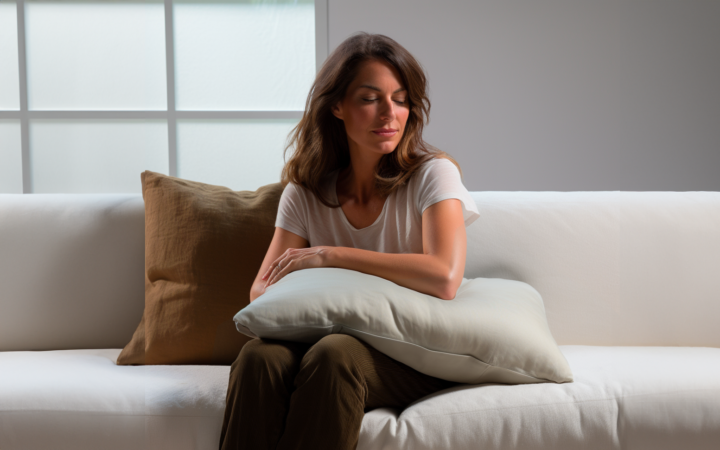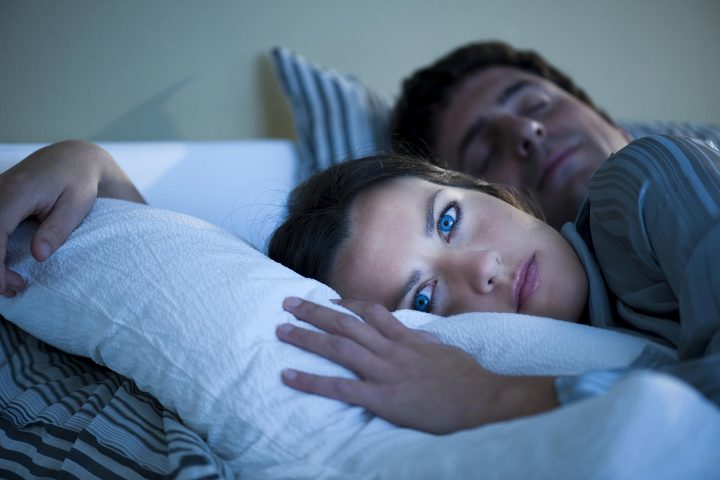
Hugging a weighted pillow is like experiencing a gentle, enveloping embrace. The uniform pressure creates an instant sense of calm and coziness. It’s like a reassuring pat on the back, telling you, “You’re doing great, and everything’s going to be just fine.”
– Luna Dreamweaver, Blissville, CA
The above description might sound a little silly, but it’s surprisingly accurate. Weighted pillows have an uncanny knack for making you feel snug and secure. They may not literally understand your feelings, but the evenly distributed pressure of a weighted pillow does provide a genuine sense of relaxation and tranquility. People love them for a reason, after all!
This feeling is a manifestation of the well-documented principle of Deep Pressure Stimulation (DPS), which has been proven to reduce stress, alleviate anxiety, and enhance overall well-being.
You’ve probably already heard about weighted blankets. Growing awareness of the benefits of DPS and its positive effects on mental health and well-being have made them a very popular story in the media. As these blankets have become more widely available, they’ve garnered a dedicated following. The surge in interest reflects a growing awareness of the importance of self-care and the pursuit of a more balanced and peaceful life, turning weighted blankets into a soothing symbol of modern well-being.
Like their blanket counterparts, weighted pillows apply uniform weight and pressure to the body. Drawing from DPS research and user feedback, these pillows have been found to provide the same comfort and relief that weighted blankets do.
The Magic of Deep Pressure Stimulation (DPS)
Evidence shows that Deep Pressure Stimulation (DPS) offers a myriad of benefits. Apparently it’s the concept of “even pressure” that unlocks its therapeutic potential. Consistent pressure, whether from a weighted blanket, vest, or pillow, activates the body’s parasympathetic nervous system, signaling it to relax and reduce stress. MAGIC!
DPS offers a wide range of benefits, including:
- Stress Reduction: DPS has a calming effect on the nervous system, reducing the production of stress hormones like cortisol, and promoting relaxation.
- Improved Sleep: Many people find that DPS helps them fall asleep faster and enjoy deeper, more restful sleep by reducing restlessness and nighttime awakenings.
- Anxiety Relief: The soothing pressure from DPS can alleviate symptoms of anxiety, promoting a sense of security and tranquility.
- Mood Enhancement: DPS is associated with increased serotonin and dopamine production, which can lead to improved mood and a sense of well-being.
- Sensory Regulation: DPS is beneficial for individuals with sensory processing disorders, such as autism or ADHD, as it can help modulate sensory input and reduce sensory overload.
- Pain Relief: DPS can alleviate discomfort and pain in conditions such as fibromyalgia, arthritis, and muscle tension by promoting relaxation and reducing muscle tension.
- Focus and Attention: Some individuals, particularly those with ADHD, find that DPS can improve focus and concentration.
- Emotional Regulation: DPS can help individuals manage and regulate their emotions by promoting a sense of calm and emotional stability.
What are my weighted pillow options?
Most weighted pillows are filled with materials such as glass beads, plastic pellets, buckwheat hulls, or other dense pillow filling types. The filling in these pillows is notably heftier than the types used in traditional bed pillows.
When purchasing a weighted pillow, several considerations should be taken into account to ensure that it meets your needs and preferences:
- Materials: Pay attention to the materials used in the pillow’s cover. It should be durable and breathable. Weighted pillows are considerably heavier than traditional pillows and thus require a more durable cover. We recommend breathable organic cotton and double-stitched seams!
- Cover Type: Check if the pillow’s cover is removable and machine washable. This feature can make maintenance and hygiene more convenient. A zippered opening that allows the filling to be removed before a wash is a must for most weighted pillows.
- Weight: Weighted pillows come in various weight options, typically ranging from a few pounds to over 10 pounds. Choose a weight that provides the desired level of pressure without feeling too overwhelming.
- Size: Weighted pillows are available in different dimensions, including standard, queen, and king sizes. Consider the size of the pillow in relation to your bed and your own body size for the best fit.
What weighted pillow do we recommend? A Hullo buckwheat pillow of course!
A buckwheat pillow’s unique hull filling makes it an excellent choice as a weighted pillow. The natural weight of buckwheat hulls provides a gentle and evenly distributed pressure. Additionally, buckwheat hull filling is a superior alternative to petrochemical-produced pillow filling like plastic beads for several reasons:
- All-Natural: Buckwheat hulls are a natural, plant-based material, free from potentially dangerous synthetic chemicals.
- Breathability: Buckwheat hulls allow for better air circulation, helping regulate temperature and preventing the buildup of heat and moisture, which can be a concern with some synthetic fillings.
- Eco-Friendly: Choosing buckwheat hulls promotes sustainability as it reduces reliance on non-renewable petrochemical resources. Buckwheat is a 100% Compostable and renewable resource.
- Durability: Buckwheat hulls are known for their long-lasting nature, reducing the need for frequent pillow replacements. Mother earth and your wallet will both approve.
Buckwheat pillows provide a safe and environmentally friendly option for those seeking all the benefits of a weighted pillow. With its all-natural properties, a buckwheat pillow can give a soothing and calming sleep experience, reducing stress and promoting a restful night’s sleep while prioritizing safety and sustainability.
Alternatively, you can make your own weighted pillow.

This poor woman is having trouble sleeping due to some heavy-duty stress, while her husband dreams of nachos and cheese.
Have you laid awake at night worrying about the future when you should be sleeping? It’s a known fact that stress can modify sleep-wakefulness cycles. Sleep is critical to proper brain function – no less than air, water, and food.
Any amount of sleep deprivation will diminish mental performance, cautions Mark Mahowald, a professor of neurology at the University of Minnesota Medical School.
“One complete night of sleep deprivation is as impairing in simulated driving tests as a legally intoxicating blood-alcohol level.”
Previous work by Dr. Van Cauter, a professor of medicine at the University of Chicago, found that “metabolic and endocrine changes resulting from a significant sleep debt mimic many of the hallmarks of aging. We suspect that chronic sleep loss may not only hasten the onset but could also increase the severity of age-related ailments such as diabetes, hypertension, obesity, and memory loss.”[1]
Why do some people have problems with stress and sleep?
Research suggests that the difference may be explained by the ways people cope. At Tel Aviv University, Dr. Avi Sadeh conducted a study of students. He found that those “who tended to focus on their emotions and anxiety during the high-stress period were more likely to shorten their sleep, while those who tended to ignore emotions and focus on tasks extended their sleep and shut themselves off from stress.”
The researchers recorded the sleep patterns of 36 students (aged 22 to 32) during a routine week of studies, and again during a highly stressful month. Sleep quality improved or remained the same for students who directed their focus away from their emotions, but diminished for those who fretted and brooded as a way to cope with stress.
Almost titling his paper, “If you can’t cope with it, sleep on it,” Sadeh said “sometimes sleep can help you regulate your nervousness and offer you an escape from stress, particularly when there’s nothing you can do about it.”[2]
1. Spectrum, March-April 1998
2. Psychology Today, March-April 1998
